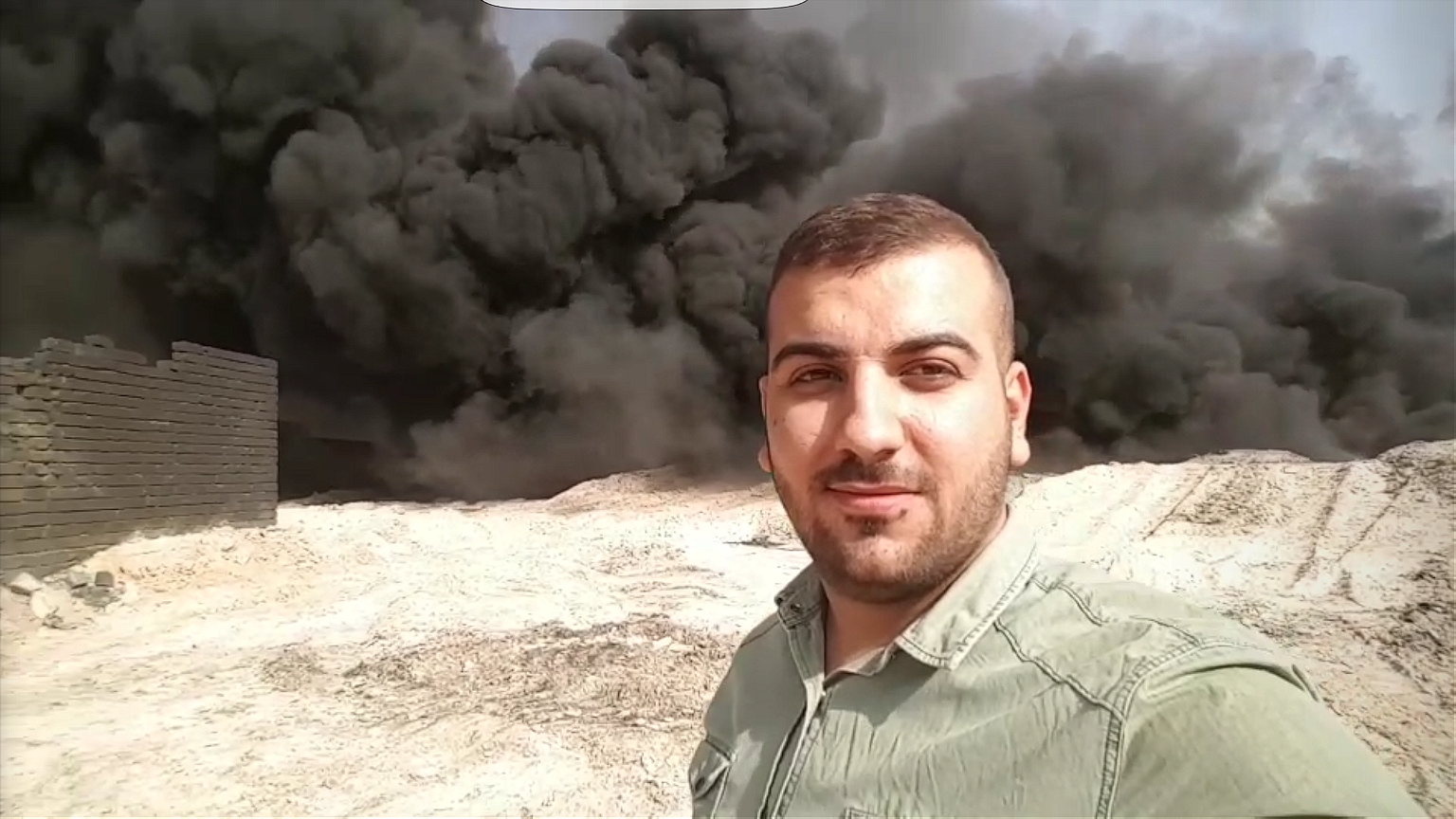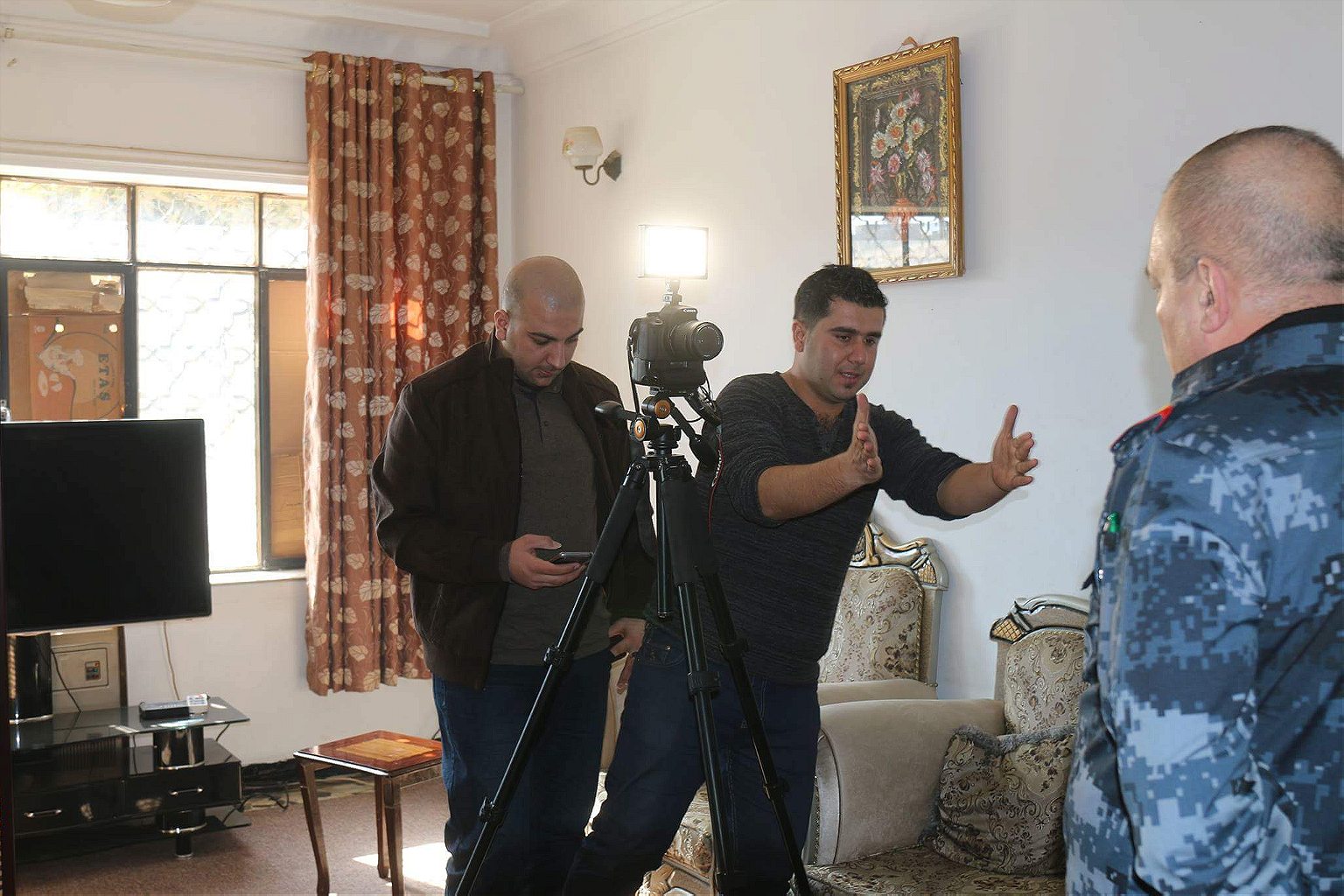Working behind the scenes of international headlines in Iraq.
In international journalism, a local journalist hired by foreign reporters for his or her special knowledge of the local area, culture, and language is called a fixer. This series explores the untold stories behind their largely unrecognized work. You can read about fixing in Rwanda, China, Mexico, Belarus, and Afghanistan.
Erbil, the capital city of the semi-autonomous region of Iraqi Kurdistan, is a center of bustling commerce and culture and is considered a safe zone, relatively removed from the violence in other regions of Iraq. It has become a refuge for those fleeing ISIS and fighting in the country. Many foreign journalists pass through the city while covering conflicts elsewhere.
Zhyar Rawf has worked as a fixer based in Erbil for the last four years. He has interviewed dozens of former ISIS members and worked with journalists from around the world to investigate the militants, as well as working as a journalist and video producer himself. He talked to R&K about growing up during wartime, Donald Trump, and the difficulty of navigating two cultures.
Roads & Kingdoms: How did you get started as a fixer?
Zhyar Rawf: In the beginning, I was studying at the university in Erbil. In 2012, I did not speak English, I was just able to understand basics. The next year, I found some English friends. We would hang out for drinks like two or three times a week. I started to improve my English with them. I was studying, so I wasn’t working. But after ISIS came, a friend told me I had skills and was a good worker. He said, “Why don’t you start working as a fixer?”
He told me a fixer is a person who facilities arrangements on the ground for the foreigners or journalists who come to cover this fight. I was like, “I am not a good person for this job. I am too young, right now I am just 23 years old.” But I found a foreign journalist who added me to a group called Kurdistan Fixers. In this group, I saw posts asking for translators and fixers. I worked with a German guy who said he would pay me $200 per day to find him a German volunteer helping in the Kurdish fight against ISIS. After one week, he disappeared and he never got back to me. A Hungarian guy came to the region and was looking for a fixer. We communicated and agreed to work together. He was paying $250 a day, but the first day I caused a car accident. I paid the entire payment for the car as there is no insurance here.
But after this, I worked with more and more journalists from abroad. I met a correspondent from [a media outlet]. I worked with them as a fixer and was also pitching [stories]. I hired a crew and started doing some interviews. I was then working as a producer, and I covered at least two stories a month; sometimes 10 a month. I was pitching, covering the story, making the videos, getting interviews, getting everything translated. They [would] make a voice-over for the story and then publish it.
R&K: You must be very busy.
Rawf: Yes. It is not easy. Even when I am back from the field I don’t have time to rest. I have worked with more than 200 journalists. Currently, I have ten fixers working for me. I was the first one in the Mosul operation that advanced with the armed forces. That day, I almost died with my brother. He was fighting there and I was covering the story with my camera crew.

R&K: As a fixer, have you faced any direct threats or intimidation?
Rawf: Before I was a fixer, my uncle was killed in an explosion. My family and I went to help with the body and the family. During this time, we got two or three letters from terrorists. But while fixing, I haven’t had any direct threat from ISIS. But I am sure ISIS have all the details about me and if they arrest me they will not only behead me but they will cut me in pieces!
R&K: It doesn’t sound like you find that intimidating.
Rawf: Not really. I don’t even care about it. I have grown up with fighting. From 2006 to 2011, I was in Kirkuk. There were explosions every day. If there was not an explosion one day we were scared because the next day would be an even bloodier day. The next days would be three or four explosions at once.
R&K: Do foreign journalists have misconceptions about Erbil?
Rawf: Almost all have the same view of Erbil. They feel safe.
R&K: Do you think that the travel ban being imposed by President Trump in the U.S. will create new tensions in Iraq?
Rawf: I don’t support Trump as he is not my president and I have nothing to do with him. But what he does [with the ban] is something that is neither totally wrong nor totally right. Some translators and workers who have dealings with America can’t live here anymore because there are threats on their lives. America should support them and welcome them. It’s part of [having] humanity. But America should not welcome me if there is no threat on my life here, just because Iraq is not a perfect place to live.
But l will tell you one thing about politics. There is no positivity. It all consists of lying and killings and suffering. I would never be a politician.
R&K: Since the rise of ISIS and the growing international focus on Kurdistan, has there been more foreign interest in Kurdish culture?
Rawf: To be honest, [many] of the journalists are here only to make some stories that will be popular and make money. They investigate, too. But they are more concerned with the ISIS war rather than our culture.
R&K: Does that bother you?
Rawf: Yes, especially the freelancers. They are annoying people. They treat us like low-class people. They treat us like we’re garbage. When you’re a fixer working with a foreign freelancer they treat like you shit. Like you are a slave. They pay you money so you have to do whatever they want. They are like the military; I take orders from them.

R&K: So you think there is a disconnect between Iraqi and Kurdish fixers and the foreign journalists they work with?
Rawf: Here’s how the majority of foreign journalists look at Iraqis and the Kurds and the fixers. They think that Kurdistan is a place where the rules are corrupt and easy to change. We respect foreigners a lot. We put them before ourselves. But they don’t respect our rules. They think that if you have good connections there are no rules. It is really bad. We are people, we have our own government, our own rules. We are not a toy. They see fixers as slaves.
In the field, there are seven or eight people, each asks you for different things. A person cannot take orders from 10 people. There was an American working with [one organization]. One day, we were planning what we would do and this American was talking about the Kurds, he was saying how we were stupid. He said: “If you have good connections you can do what you want. Corruption gets what you want.” I looked at him and said, “You do not work with me anymore. I won’t do anything bad to you as you are in my country. You don’t respect my people, that means you don’t respect me.” The company found another fixer for him. Some other people from the team did the same thing. They were not respectful, so they stopped working with them.
Another [media outlet] wanted to give me $3,200 to interview an ISIS intelligence prisoner. I was the only one who had permission to interview him. The next day when we were supposed to go to the interview, I was half an hour late because of the hotel check point. When I got into the hotel I apologized to the producer. I then went to shake the reporter’s hand, but the reporter turned away.
I said, “Why don’t you want to shake my hand?” He said, “Your fucking thirty minutes late, blar blar blar.” I said, “Fuck your money and fuck your work. Do it yourself.” I was not that much of an asshole, but it was simple. They don’t respect me and I refuse to work with them. I didn’t do the work and they complained about me. This is disrespectful. As a fixer, how do you think I feel?
R&K: I’m sorry that happened to you.
Rawf: Ah, no worries! If I am concerned with these things, I have to stop working. These things won’t stop me. I have been 20 meters away from ISIS. I have survived their snipers. To be a fixer is not easy.
This interview has been edited and condensed for clarity. The names of media outlets have been withheld at the request of the interviewee.